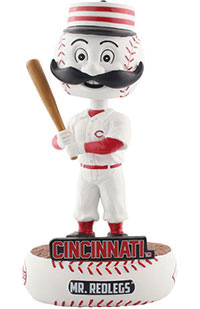Court Considers State Tax on Bobblehead Giveaways

The Court will consider whether the Cincinnati Reds must pay tax on giveaways.

The Court will consider whether the Cincinnati Reds must pay tax on giveaways.
The Cincinnati Reds are hoping to avoid being at least the third major league baseball team to strike out on paying state sales tax on bobbleheads and other promotional items they give away at games.
As an incentive to purchase tickets to certain home games, the Reds provide attending fans with varying promotional items ranging from reusable grocery bags to bobbleheads —the miniature statues of Reds players with oversized heads that bobble. The Ohio Department of Taxation audited the Reds for purchases the club made from 2008 through 2010. The Ohio tax commissioner determined that the Reds owed about $88,000 in “use tax” for the promotional items they bought from vendors and intended to give away at the games. The department is also seeking a penalty and interest for the non-payment of the tax.
In Cincinnati Reds v. Testa, the Reds appealed the decision to the Ohio Board of Tax Appeals (BTA), arguing that the promotional items are advertised as “free” to potential ticket buyers, but that the actual costs of the items are factored into the ticket price. The Reds consider the giveaways to be items for resale under Ohio law, and those items are exempt from the sales and use tax. The BTA ruled that because the price of a ticket for a game with a promotional item is the same as the price for a game without an item, the Reds were not reselling the items, and upheld the tax commissioner’s assessment. The Reds appealed the BTA decision to the Supreme Court, which will hear oral argument in the case.
The Ohio Supreme Court will be at least the fourth state high court to decide the issue of taxation of major league baseball giveaways. The parties note that the Kansas City Royals successfully challenged the imposition of state sales and use tax, while the high courts in Wisconsin and Minnesota ruled the Milwaukee Brewers, and the Minnesota Twins had to pay tax on giveaways.
Oral Argument Details
Arguments in the Reds case will be presented on June 13. It is one of five cases the Supreme Court will hear during two days of oral arguments on June 12 and 13. Oral arguments begin at 9 a.m. at the Thomas J. Moyer Ohio Judicial Center in Columbus. All arguments are streamed live online at sc.ohio.gov and broadcast live and archived on The Ohio Channel.
Case Previews Released
Along with the descriptions provided in this article, the Supreme Court’s Office of Public Information today released in-depth previews of the central arguments in each case.
Tuesday, June 12 Cases
A death penalty case involving the 1994 murder of a Wilmington woman was returned to the trial court for resentencing because the defendant didn’t have the chance to make an unsworn statement during the original proceedings. After a hearing, the trial court reimposed the death sentence and resentenced the man on other counts. James R. Goff argues in State v. Goff that, based on the U.S. Supreme Court’s 2016 ruling striking down Florida’s death penalty sentencing system, a jury had to be empaneled to consider the evidence presented at his resentencing hearing. He also contends that his lawyers didn’t prepare him adequately to make the statement and that he should’ve been permitted to offer additional mitigating circumstances at the hearing.
A northwestern Ohio university had to spend $6 million to fix damage to a new hotel and conference center it paid a contractor $8 million to construct. The university and contractor determined the damage was caused by the faulty work of subcontractors. When the contractor sought to cover the damage by filing a claim with its insurance company, it was denied. The insurance company determined the policy didn’t cover faulty workmanship by the contractor, and that included subcontractors, too. In Ohio Northern University v. Charles Construction Services, the university and contractor claim the faulty work is covered by the policy if the work was done by subcontractors and was discovered after the project was complete.
In State v. Vega, a university police officer stopped a man in Cleveland for a traffic violation and smelled a strong marijuana odor when approaching the car. In a search of the vehicle, the officer found marijuana, a candy pack, three cell phones, rolling papers, aerosol containers, and two large sealed envelopes. After issuing citations, the officer opened the envelopes and discovered baggies filled with candy that contained THC. However, the evidence from the envelopes was excluded at trial. Maintaining that all the circumstances established probable cause to open the envelopes, the Cuyahoga County prosecutor asserts that the evidence should be allowed at trial. The man counters that the smell of the drug didn’t give probable cause for the officer to open every item found during the search.
Wednesday, June 13 Case
A Girard man pled no contest to animal cruelty in 2016 for beating his dog. The case, Girard v. Giordano, involves a state law that requires a court to “call for an explanation of the circumstances of the offense” when receiving a guilty plea. Because the trial court didn’t provide the explanation, the appellate court overturned the man’s conviction, concluding that double jeopardy prevents the case from returning to the trial court to determine his guilt or innocence. The city maintains that the procedural error doesn’t mean the man is cleared of criminal liability. The city asks the Supreme Court to return the case to the trial court for additional proceedings or to uphold the conviction based on facts in the record that supported the guilty finding.


